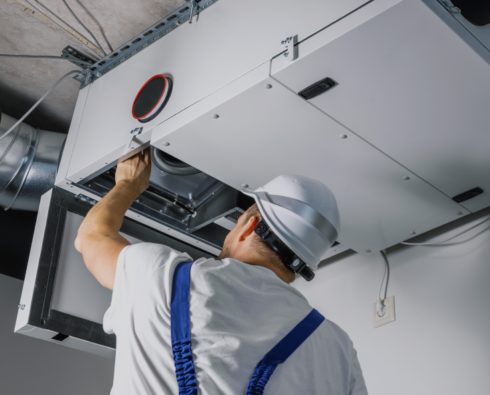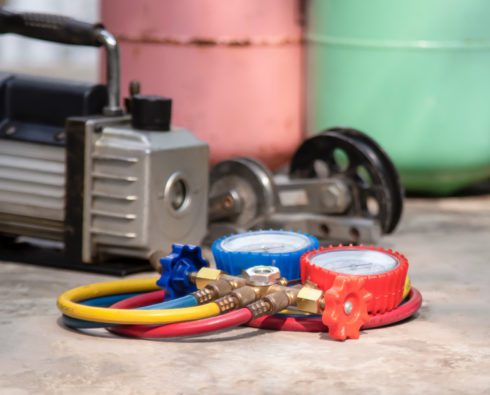
Ducted vs. Ductless HVAC Systems: How They Compare
Ducted or ductless? Is one better than the other? Which one should you choose and why?
If you’re an HVAC contractor or dealer, you’ve undoubtedly noticed these questions getting asked more often in recent years. And not just in relation to new residential construction projects.
As demand for more efficient and effective HVAC equipment heats up, homeowners looking to renovate or upgrade their systems are also looking for the correct answers. That puts HVAC pros in the perfect spot to cut through the noise and help guide homeowners to the best solutions for their specific homes.
Even if you think you know ducted and ductless like the back of your hand, brushing up on the basics never hurts. Often, the basics are the kind of talking points customers need to help them make a more informed decision.
Comparing ducted vs. ductless HVAC systems
When you’re chatting with a homeowner interested in upgrading their system to either ducted or ductless, your goal is to help them narrow their options by providing critical information.
With so many variables in the mix, making a confident decision can be challenging for someone who isn’t an HVAC pro. So, instead of running through a long list of facts and comparison statements, it’s helpful to keep the conversation focused on finding the best option for their home, needs, and budget.
Consider the home itself
Start by taking the specifics of the home into account. For instance, if it already has a ductwork system, installing a ductless heat pump or mini-split might be needlessly expensive—at least in comparison to sticking with what’s already in place.
On the other hand, if that existing ductwork needs a lot of repairs, and the existing furnace or heat pump needs replacing anyway, then the difference in cost to switching the home to a ductless setup will be less cost-prohibitive.
Of course, not all homes can easily accommodate ductwork at all. In these cases, deciding between ducted and ductless is easy.
Identify the homeowner’s needs
Generally, ducted systems are best for larger homes requiring whole-home heating and cooling. In comparison, ductless systems are more suitable for smaller homes or homes requiring targeted heating and cooling in specific rooms.
If the homeowner wants something close to uniform heating and cooling throughout the home, ducted is the ideal choice. However, suppose the house doesn’t already have ductwork installed. In that case, you and the homeowner need to account for the added installation costs of installing that new ductwork, which may change the option.
Factor in the homeowner’s budget
Which one’s more expensive? Ducted or ductless? There’s no universal answer because it will almost always depend on the specifics of each home.
For example, if a home doesn’t have existing ductwork, installing a ducted system will be more expensive than installing a ductless one. On the other hand, if a home has existing ductwork, sticking with a ducted system will be considerably cheaper than installing a ductless one.
The homeowner’s budget is probably the most important factor when discussing options. They might want the comprehensive whole-home heating and cooling that ducted systems deliver but only have the budget for a ductless heat pump system that covers most—but not all—of the rooms in their home.
Ducted vs. ductless HVAC systems: Other things to consider
While the specifics of the home, the preferences of people living there, and the homeowner’s budget are the most important factors to consider, they’re not the only ones.
Home aesthetics
There’s a big difference between ducted and ductless regarding appearance. With ducted systems, ductwork is hidden in walls, floors and ceilings, and only small registers and grilles are visible. Ductless systems, meanwhile, consist of reasonably large wall-mounted units in each temperature-controlled room or zone.
Environmental friendliness
More eco-conscious customers might like to know that ductless systems tend to be more efficient, as they don’t experience the same amount of energy loss through ductwork as ducted systems. Not only is this good for the environment, but it can also result in savings on utility bills.
Noise levels
Modern HVAC equipment—both ducted and ductless—is getting quieter. Even still, ducted systems offer more silent operation than ductless systems, which require indoor units installed throughout the home.
Making the best choice: ducted vs. ductless
When comparing ducted versus ductless, it’s important to emphasize to your customers that one isn’t necessarily better. They both have their unique pros and cons, and other factors also come into play, such as the home’s layout, the preferences of the people who live there, and the homeowner’s budget.
By embracing your role as an educator, you can help guide your customers to make a confident decision that best suits their needs and budget.






































